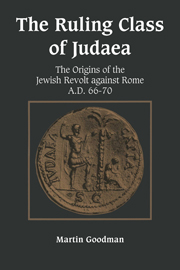Book contents
- Frontmatter
- Contents
- Abbreviations
- Preface
- Maps
- 1 Introduction
- PART I THE RULING CLASS A.D. 6–66
- 2 The new ruling class a.d. 6
- 3 Problems facing the ruling class: economic and social
- 4 Problems facing the ruling class: religious ideology
- 5 Why the ruling class failed
- PART II FACTION STRUGGLE WITHIN THE RULING CLASS
- PART III THE AFTERMATH OF THE REVOLT
- Select bibliography
- Index
3 - Problems facing the ruling class: economic and social
Published online by Cambridge University Press: 01 June 2011
- Frontmatter
- Contents
- Abbreviations
- Preface
- Maps
- 1 Introduction
- PART I THE RULING CLASS A.D. 6–66
- 2 The new ruling class a.d. 6
- 3 Problems facing the ruling class: economic and social
- 4 Problems facing the ruling class: religious ideology
- 5 Why the ruling class failed
- PART II FACTION STRUGGLE WITHIN THE RULING CLASS
- PART III THE AFTERMATH OF THE REVOLT
- Select bibliography
- Index
Summary
The origin of much of the social tension in Judaea lay in the growth and changing nature of the Judaean economy, which fuelled class hostility of increasing intensity. Josephus speaks of a universal sickness in Judaea from a.d. 6, which led the rich to oppress the masses and the masses to plunder the rich (B.J. 7.260–1). He sometimes describes the struggle between pro-Roman and revolutionary Jews in terms of a class war; a description which, though probably a misleading picture of the revolt itself when rich and poor were largely united against Rome (see below, pp. 176–201), is a fair reflection of much of the violence in the Judaean countryside both before the war broke out and after. Some of the revolutionaries indulged in banditry, murdering the leading men, looting the houses of the wealthy and setting villages on fire. The causes of such hostility lay in the widening gap between rich and poor as the economy of Judaea was integrated, in a unique fashion, into the wider Mediterranean world.
The centre of the Judaean economy was Jerusalem, which ‘dominates all the neighbourhood as the head towers above the body’ (B.J. 3.54). The countryside was productive: Josephus mentions grain, wood, fruits and cattle (B.J. 3.49–50), to which should be added olives and vines on the terraced hills and sheep and goats for sacrifice in the Temple.
- Type
- Chapter
- Information
- The Ruling Class of JudaeaThe Origins of the Jewish Revolt against Rome, A.D. 66–70, pp. 51 - 75Publisher: Cambridge University PressPrint publication year: 1987



